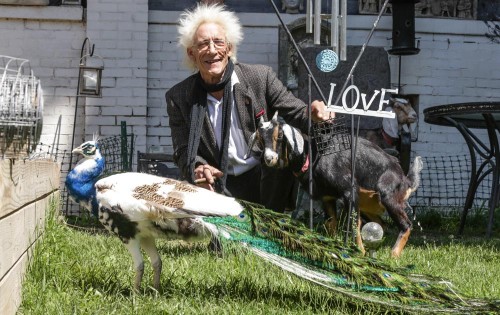INDIANAPOLIS — More than 100 people packed a pot-smoking Indiana cannabis church for a music-filled service without their illegal sacrament Wednesday, days after authorities threatened arrests if the congregation lit up during the rites.
Participants in the inaugural service of the First Church of Cannabis, formed as a test of Indiana’s new religious objections law, had planned to celebrate by smoking marijuana. But church founder Bill Levin decided to keep pot out of the first service to ensure that he can test that law in civil court and not on criminal grounds.
Marijuana is illegal in Indiana, but Levin plans to defend the congregation’s pot smoking during religious ceremonies under the new law, which took effect Wednesday. It prohibits any government actions that would “substantially burden” a person’s ability to follow his or her religious beliefs.
Marijuana and religion
Op-ed: Why isn’t Rastafari a respected religion? Because of pot prejudice
Marijuana reform: Historic new ganja laws in Jamaica for Rastafari religious use, MMJ program
A drug temple in Nebraska? ‘Priestess’ convicted on pot charges
Pot shop protest: Westboro Baptist Church protested Colorado pot, but they were outnumbered
NEW: Get podcasts of The Cannabist Show.
Subscribe to our newsletter here.
Levin, who calls himself the church’s “Grand Poobah,” noted during the service that Indianapolis’ police chief and the local prosecutor warned last week that church members could face arrest if they smoked pot during the service.
“If we weren’t intimidated this would be the sacrament box, folks — this is the box we keep our sacrament in,” the 59-year-old said, holding up a small wooden box that a fellow church member presented to him. “Unfortunately, there’s no sacrament in it today, so just pretend, folks.”
Most of the congregants followed suit, pretending to pass joints and puff from them.
About two dozen police officers kept watch over the church, but no arrests were made during the two-hour service that included lively performances of funk and reggae songs. The music brought the congregation to its feet several times inside the small chapel in a residential area on Indianapolis’ south side.
Several church members stood before the flock during the service to give testimonials about how marijuana’s medicinal qualities had alleviated or cured their ailments, with one woman declaring, “Thank God for pot.”
The church’s interior includes a painted version of Michelangelo’s famed Sistine Chapel fresco depicting God’s hand reaching out to man — although God offers mankind a big joint in First Church of Cannabis’ version.
During the service, about 40 neighbors and members of a nearby Christian church stood across the street holding protest signs, including one that read: “Religious freedom does not mean freedom to commit crimes.”
“I don’t know what they’re thinking. It’s not legal here and I pray that it doesn’t become legal,” Church of Acts member Marva Tillman said of First Church of Cannabis’ plans to use marijuana as a key part of its doctrine.

Daniel East, who lives two houses down, said he is not worried about the church’s presence in the neighborhood and has spoken to Levin, a self-employed carpenter and concert promoter with distinctive spiky, white hair.
“I don’t necessarily subscribe to his religious beliefs, but I don’t care what they do as long as they don’t tear up the neighborhood,” East said.
Levin founded the First Church of Cannabis on March 26 — the same day Gov. Mike Pence signed Indiana’s religious objections measure into law. The IRS granted the church tax-exempt status in May.
Levin said the church has more than 1,000 members and is built “on the cornerstone of love, compassion and good health” and isn’t just a place for its members to get high.
Indiana’s law sparked protests and boycott threats this spring amid concerns it could provide a legal defense to discriminate against gays, lesbians and others. Lawmakers later revised the law to address those concerns.
The law was modeled after the Religious Freedom Restoration Act that Congress passed in 1993 in response to a 1990 U.S. Supreme Court decision that said laws otherwise neutral toward religion are not unconstitutional just because they may infringe on the religious beliefs of some people.
In that ruling, the high court held in an Oregon case involving Indian rituals that there was no constitutional right to take the hallucinogenic drug peyote as a religious practice.
